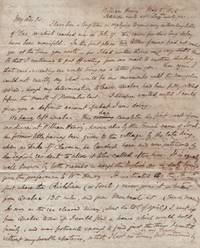Single letter measuring 8 x 5 inches, one double-sided sheet
1864 · Richmond, Virginia
by [Civil War - Confederacy] F.H., Amanda
Richmond, Virginia, 1864. Single letter measuring 8 x 5 inches, one double-sided sheet. Excellent condition.. A letter written by "Cousin Amanda" of Richmond, Virginia, detailing the price and quality of cloth, cotton spools, and flour available to her late in the American Civil War. The Confederacy was under a blockade, and Union forces were destroying anything deemed valuable to the Confederate cause, including cotton fields and textile mills, causing prices to skyrocket even for inferior goods. Amanda writes that moldy cloth was being sold for what today would be well over $200 per yard:
"At some of the Jews stores today I found yard wide purple calicoes at $12, (damaged) with yellow spots all over them. The merchants assured they would wash out and Sue Coulling who was with me thought so too, but I do not. Not one of them would give me samples to try. [...] Cotton is from $4 to $5 for a spool."
Most shocking is the cost of flour; Amanda thanks her cousin for "letting us have" some flour "so cheap", as "It is $350 here and we certainly expected to pay that." A little over a year earlier, in April of 1863, an armed mob of women in Richmond had marched on the governor's office in protest of the untenable cost of food, storming and looting storehouses in what came to be known as the Richmond Bread Riot.
Of interest for those studying civilian life during the American Civil War and especially textile history. (Inventory #: List2603)
"At some of the Jews stores today I found yard wide purple calicoes at $12, (damaged) with yellow spots all over them. The merchants assured they would wash out and Sue Coulling who was with me thought so too, but I do not. Not one of them would give me samples to try. [...] Cotton is from $4 to $5 for a spool."
Most shocking is the cost of flour; Amanda thanks her cousin for "letting us have" some flour "so cheap", as "It is $350 here and we certainly expected to pay that." A little over a year earlier, in April of 1863, an armed mob of women in Richmond had marched on the governor's office in protest of the untenable cost of food, storming and looting storehouses in what came to be known as the Richmond Bread Riot.
Of interest for those studying civilian life during the American Civil War and especially textile history. (Inventory #: List2603)


















